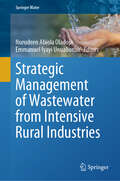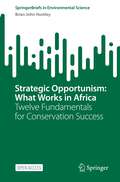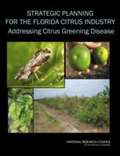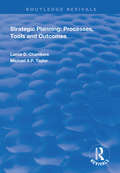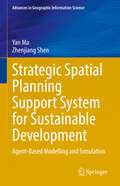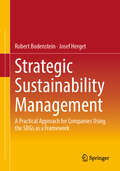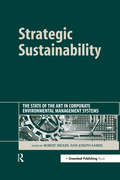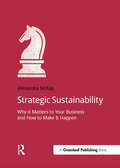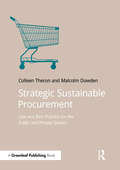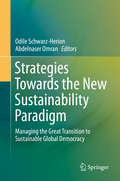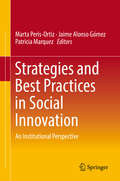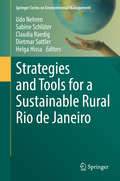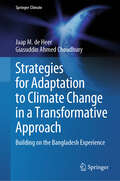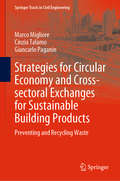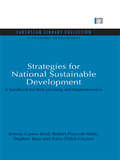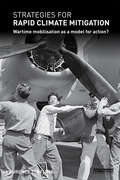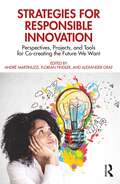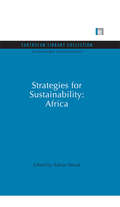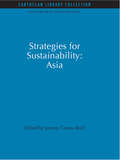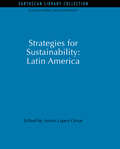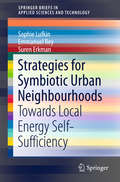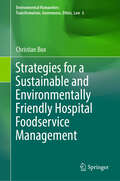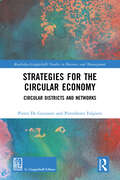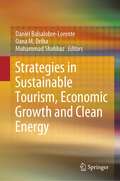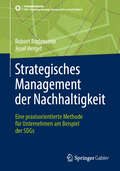- Table View
- List View
Strategic Management of Wastewater from Intensive Rural Industries (Springer Water)
by Nurudeen Abiola Oladoja Emmanuel Iyayi UnuabonahThis book provides insight into the environmental and ecological impacts of the operations of intensive rural industries and how these undesirable impacts can be effectively managed. In the developing economies, the different human empowerment and poverty alleviation schemes have produced myriads of intensive rural industries that littered States in these economies. These industries are often characterized by their small scale, outmoded technology, obsolete equipment, poor management and large water consumption. Since their operations usually consume large volume of fresh water, high magnitude of untreated wastewater is equally discharged. The huge consumption of freshwater puts a lot of stress on freshwater resource available for human use, and the discharge of contaminated wastewater from these industries disrupts the ecological balance. It has been reported that untreated industrial waste constitutes about two-thirds of the total waste discharge into water bodies, and the largest chunk of this is derived from rural enterprises. Therefore, the environmental cost of rural industrialization is enormous and needs to be examined.The evaluation of the quality characteristics, the socioeconomic impacts and the law guiding the generation and the discharge of the wastewater from specific rural industries are enunciated. The conventional practice and the trends in the effective management of specific wastewater samples are also discussed.
Strategic Opportunism: Twelve Fundamentals for Conservation Success (SpringerBriefs in Environmental Science)
by Brian John HuntleyThis open access book. provides a synthesis of six projects, across ten countries, each of which have been sustained for two or more decades, and which illustrate how success can be achieved regardless of systems of governance, of a nation’s wealth, or of culture. Detailed narratives are presented on the key personalities that have conceived, conducted and concluded long-term projects: personal stories of vision, failure, frustration and persistence ultimately leading to success.The case studies vary widely in their geography and goals. The single-handed commitment to re-discover the last surviving populations of Giant Sable in the miombo woodlands of central Angola, through the capture, translocation and establishment of robust breeding herds of this magnificent antelope, contrasts with the massively funded, three-decade programme with over one hundred participants that reversed the annual loss to predation by feral cats of 455 000 seabirds from a sub-Antarctic island. Similarly, the foresight of Zimbabwean and Namibian ecologists to place rural communities at the centre of conservation programmes by giving value to wildlife populations and benefits to local people, transformed a land degradation problem to a socio-ecological solution. Across ten countries, building capacity in botanical collection, documentation and herbarium management expanded into a global project to place the knowledge base of Africa’s flora onto an electronic data system accessible to researchers and conservation planners in even the most remote corners of the continent. None of these projects enjoyed immediate results. Each required leadership skills that combined vision, a generosity of spirit, fortuitous timing and the exploitation of unexpected opportunities.
Strategic Planning for the Florida Citrus Industry: Addressing Citrus Greening Disease
by National Research Council of the National AcademiesCitrus greening, a disease that reduces yield, compromises the flavor, color, and size of citrus fruit and eventually kills the citrus tree, is now present in all 34 Floridian citrus-producing counties. Caused by an insect-spread bacterial infection, the disease reduced citrus production in 2008 by several percent and continues to spread, threatening the existence of Florida's $9.3 billion citrus industry. A successful citrus greening response will focus on earlier detection of diseased trees, so that these sources of new infections can be removed more quickly, and on new methods to control the insects that carry the bacteria. In the longerterm, technologies such as genomics could be used to develop new citrus strains that are resistant to both the bacteria and the insect.
Strategic Planning: Processes, Tools And Outcomes (Routledge Revivals)
by Michael A.P. Taylor Lance D. ChambersFirst published in 1999, this book examines the 'how' and 'why' of strategic planning, illustrates the vital role it plays in our day-to-day lives and explores its potential for helping to ensure the future viability of humanity and of the cultures and societies in which we live. The authors describe the processes and major impediments in high level strategic planning, introduce a new mechanism, new tools and processes and provide a number of case studies to demonstrate the use of the proposed methodology. 'Strategic Planning: Processes, Tools and Outcomes' will be invaluable reading for academics and students of planning and for planning practitioners around the world.
Strategic Spatial Planning Support System for Sustainable Development: Agent-Based Modelling and Simulation (Advances in Geographic Information Science)
by Zhenjiang Shen Yan MaThis book introduces a planning support system called Strategic Spatial Plan Support System (SSP-SS) to visualize population growth and predict energy demand, land use, and waste discharge resulting from urbanization. By analyzing policy interactions between household agents, the book uses SSP-SS to visualize policy effects on urban areas during stages of growth and decline. Simulations are created based on these policy outcome assessments, taking into account the influences of energy and resource consumption on sustainable development in urban environments. The book is geared towards researchers, universities, and urban policy makers.The book begins by presenting a framework of urban growth simulation, and introducing SSP-SS. Then, household lifecycle and relocation models are employed for simulating policy impacts on urbanization, and investigating the impacts of spatial strategic planning. Several projects are assessed using agent-based modeling including shopping centre construction, day-care service for aging populations, and shelter accommodation capacities for earthquakes and other disasters. The final chapters discuss water and energy management, the environmental impacts of demand and consumption, and future recommendations for sustainable development and policy implementation.Introduces Strategic Spatial Plan Support System (SSP-SS) to visualize population growth and predict energy demand, land use, and waste discharge resulting from urbanization.Analyzes policy effects on urban areas during stages of growth and decline.Discusses the influences of water and gas consumption on environmental issues in urban areas for sustainable development.
Strategic Sustainability Management: A Practical Approach for Companies Using the SDGs as a Framework
by Josef Herget Robert BodensteinThis book provides a practical guide to implementing sustainability strategies within companies. It introduces a model-based approach that enables a comprehensive, yet focused strategy, ensuring that complexity doesn’t overshadow the core objectives. The concept of Sustainability Excellence offers a versatile methodology, designed to meet the needs of both large corporations and small businesses with limited resources. The approach is adaptable to various sustainability frameworks and strategies. To demonstrate its application, the book uses the United Nations’ Sustainable Development Goals (SDGs) as a concrete example of how the method can be put into practice. Special emphasis is placed on integrating the sustainability strategy into the corporate culture, ensuring it becomes a fundamental part of the organization's DNA. The book is enriched with practical tools, including checklists and insights into the opportunities and risks of sustainability management. It is a valuable resource for managers, business owners, consultants, and anyone interested in shaping effective sustainability strategies within their organizations.
Strategic Sustainability: The State of the Art in Corporate Environmental Management Systems
by Robert Sroufe Sarkis JosephThe last decade has seen increasing awareness of the importance of understanding corporate environmental management systems (EMSs) and their relationships with sustainability, competitiveness and institutional practice. It is now assumed that most large companies have some version of an EMS in place with systems ranging from informal policies and practices to formalised third-party certified systems that are widely publicized by companies and are now integral to their strategic direction. No matter what level and type of system a firm chooses, both practitioners and researchers wish to examine and better understand the extent to which these systems are cross-functional, how they impact on performance evaluation, their capability to monitor supply chains and the life-cycles of products and services and, most importantly, whether these systems actually make a contribution to better environmental performance. This book provides intriguing insights into strategic and sustainable EMSs. It provides clear evidence of benefits that should exceed the costs (tangible and otherwise), and help practitioners understand the attributes of well-developed and strategically focused EMSs. It also demonstrates the link to performance measures such as reputation, improved position in the marketplace, cost, quality, waste reduction and numerous sustainable development-based metrics and issues. The comprehensive scope of topics spans several industries and provides environmental systems insight involving sustainable management systems, strategic and operational impacts of environmental systems, cross-country comparisons of EMS design processes and results, product-based environmental systems, EMS impacts at innovative organisations and environmental systems integration within specific industries. The book is split into three sections. First, the book covers the broad issues of planning and designing an EMS and includes topics such as performance evaluation, comparisons between multinational environmental systems, sustainable development and links between already established quality systems and an EMS. The second section focuses on EMS implementation and operation and incorporates some corporate or industry-specific case studies. The third and final category of the book highlights the use of an EMS to evaluate business processes. Strategic Sustainability will be essential reading for both managers faced with decisions regarding their own EMSs and to researchers seeking additional insights from state-of-the-art examples for further theoretical development and testing.
Strategic Sustainability: Why it matters to your business and how to make it happen (Doshorts Ser.)
by Alexandra McKayIn many businesses sustainability is one person’s passion and responsibility. A large part of their job becomes selling sustainability to other people in the business.This book offers arguments, information and tactics will help that person get the buy-in they need to move sustainability forward in their business.Strategic Sustainability: sets out why sustainability matters to businesses – the benefits to you and your stakeholders; shows how to identify the biggest issues, impacts and wins for your business; helps you identify the resources you will need to put sustainability at the heart of your business; outlines key reasons why businesses that are not multinationals should take action on sustainability, and how to do it; looks in detail at how to integrate sustainability with business strategy and mission.Sustainability is of strategic importance to a business. This book makes an airtight case for why action is essential and how sustainability can help a business not only survive but thrive in competitive marketplaces.
Strategic Sustainable Procurement: Law and Best Practice for the Public and Private Sectors (Doshorts Ser.)
by Colleen Theron Malcolm DowdenProcurement is playing an increasingly strategic role as a lever for sustainable development and social and environmental responsibility. Greater regulation on sustainable procurement in the public sector, including significant changes to the EU Directive in April 2014, are driving this change.This comprehensive guide to sustainable procurement by practising legal experts Colleen Theron and Malcolm Dowden distils key developments in EU and UK public sustainable procurement legislation, government guidance and policy; provides an introduction to sustainable procurement more broadly; provides case studies and practical examples on contractual aspects of procurement; shows you how to set up a sustainable procurement strategy; and contributes to the development of sustainable procurement policy. There is also increased emphasis on "clean" supply chains in the private sector, as best practice seeks to mesh with public sector requirements and reduce the risk that bids for public contracts might be undermined by adverse environmental impacts or social misconduct along the supply chain.Private sector companies should act now to establish best practice sustainable procurement principles to minimize the risk of litigation; several international standards are embedding the principles of sustainable procurement into their requirements.The book also offers practical examples of what sustainable procurement entails, whether the organization is bidding for public sector contracts, in need of meeting tender requirements, looking to obtain certification for a standard, or is simply seeking to improve its supply chain management and implement best practice.
Strategies Towards the New Sustainability Paradigm
by Odile Schwarz-Herion Abdelnaser OmranOn a historical global turning point, this book offers a thorough exploration of the "New Sustainability Paradigm", originally developed by the Global Scenario Group (GSG) of the Stockholm Environmental Institute (SEI) as a starting point for analyzing real-life transitions and transformations. 11 contributors from 5 continents present detailed analyses of economic and political transitions in Western and Eastern Europe, the USA, the Middle East, and in Asia, discussing the role of different players in the implementation of the New Sustainability Paradigm. Part I offers an overview of the six scenarios developed by the GSG and a short discussion of significant papers published by the Great Transition Initiative (GTI) of the Tellus Institute. Next come examples of dramatic historical and current transitions in Western Europe, the USA, Eastern Europe, the Middle East (Arabian Spring), and Asia, as well as an analysis of the potential of humankind to manage a great transition to the new sustainability paradigm. Subsequent chapters highlight the role of culture and education and review the role of different players for the implementation of the new sustainability paradigm. The focus of Part II is on the ecological pillar of Sustainability. The discussion includes urgent ecological problems including climate engineering, eco-criminality, bioterrorism, biodiversity protection, water, energy, and food security. Part III deals with needed innovations in sustainable waste management and sustainable city architecture, especially big cities in developing and threshold countries, where a significant part of the world population is concentrated. The fourth and final section offers an analysis of insights developed throughout the book, and outlines recommendations for the implementation of the New Sustainability Paradigm by civil society, grass-root movements, scholars, politically neutral NGOs, sincere media players, and by open-minded and enlightened politicians to manage and steer the Great Transition towards sustainable global democracy.
Strategies and Best Practices in Social Innovation: An Institutional Perspective
by Marta Peris-Ortiz Jaime Alonso Gómez Patricia MarquezThis book examines the different ways companies can develop and design social innovation. Combining technological and social perspectives, the contributors present emerging research on social innovation from different sectors such as entrepreneurship, education and energy. Collectively, the authors demonstrate the ways in which social innovation can drive sustainability and development in regions around the world. All societies are characterized by their political, economic and social institutions, as well as by how they utilize technology. The social innovations with the highest importance are those which modify existing institutions or create new ones, and based on their magnitude, they can be considered as radical or incremental. For example, when Joseph Chamberlain encouraged workers to organize in order to achieve universal male suffrage in Great Britain in 1885, this was a considered a radical innovation for British society, which in turn changed its political framework. Social innovations may be based on intelligence and commitment, on technology or on social entrepreneurship in its most open forms. In addition, social innovations can be classified into those which correspond to an entire country or region, a field (e.g., education) or a sector (e.g., entrepreneurship, technology, social reform). Featuring contributions on topics such as agro-food, smart cities, higher education, gender equality and sports, this book is ideal for academics, students, scholars, professionals and policy makers in the areas of innovation, entrepreneurship, sustainability and regional development.
Strategies and Tools for a Sustainable Rural Rio de Janeiro (Springer Series On Environmental Management Ser.)
by Udo Nehren Sabine Schlϋter Claudia Raedig Dietmar Sattler Helga HissaThis book is a compilation of recent developments in land, ecosystem, and water management in the Brazilian state of Rio de Janeiro. The state is located in the biodiversity hotspot of the Atlantic Forest (Mata Atlântica), a biome characterized by high biological diversity and endemism. At the same time the state of Rio de Janeiro emerged to one of the economic hubs in Latin America. This development process has been accompanied by population growth, industrialization, urbanization, as well as consumption and degradation of land and water resources. In the past years many efforts have been made to stop or at least slow down these degradation processes and restore degraded environments with the overall goal to bring together sustainable management of natural resources, nature conservation, and economic development. An overview is provided of the different strategies and tools that have been developed in the fields of agriculture, ecosystem management and biodiversity, integrated water management, land restoration, disaster risk reduction and climate change adaptation, as well as environmental governance and economic instruments. This book covers a wide spectrum from applied research to science‐policy interfaces, planning concepts, and technical tools and has a model character for other rural areas in Latin America. Target groups are scientists, practitioners, policy makers and graduate students in the field of environmental management. The different chapters are written by researchers and practitioners of the German‐Brazilian project INTECRAL (Integrated Eco Technologies and Services for a Sustainable Rural Rio de Janeiro), the rural development program Rio Rural under the state secretary for agriculture and animal husbandry, as well as invited scientists from Brazilian universities and research institutes. It bridges existing gaps between science, policies, and practice in rural development.
Strategies for Adaptation to Climate Change in a Transformative Approach: Building on the Bangladesh Experience (Springer Climate)
by Jaap M. de Heer Giasuddin Ahmed ChoudhuryThe Bangladesh experience shows that adaptation to climate change needs to be seen in conjunction with existing and changing weather patterns, natural hazards and the natural resources systems. Moreover, adaptation to climate change has next to the physical and technical content a socio-economic dimension in relation to the many societal and economic aspects of water resources and climate change. Adaptation, in terms of strategy making and implementation, is thus embedded in a countries&’ society with its traditions, technologies, governance and policies. This means that adaptation strategy making and implementation, while focusing on the physical system and use of technologies, are primarily cultural processes, characterized by a struggle for meaning in uncertainty, sense making and sense giving to define the issues and challenges and formulate strategies, thinking about appropriate measures, taking action and managing transformation. Besides, the power-related aspects of negotiation and decision-making including budget allocation for investments are evident as well. The BDP 2100 is a strategic plan with many techno-economic analyses, choices and proposals while it is basically &‘an expression of the politics of culture&’ (De Heer, 2009, 2013).
Strategies for Circular Economy and Cross-sectoral Exchanges for Sustainable Building Products: Preventing and Recycling Waste (Springer Tracts in Civil Engineering)
by Cinzia Talamo Marco Migliore Giancarlo PaganinThis book offers a valuable tool for understanding current efforts to promote the reuse and enhancement of pre-consumer waste in the development of new products for the construction sector, as well as the financial and regulatory tools being used to support this trend. It explores the vast and complex topic of the circular economy from the perspective of strategies for the reuse/recycling of waste, and develops a number of key premises: waste reuse/recycling must be considered using a logic of cross-sectoriality, recognizing the need to enhance the “dialogue” between different sectors; pre-consumer waste is particularly interesting for the recycling market because the construction sector can reduce its environmental impacts by enhancing its capacity to use secondary raw materials and by-products from other sectors; and lastly, the manufacturing sector is currently experimenting with promising forms of reducing/recycling pre-consumer waste and is at the same time providing by-products that can be used in other production chains. As such, the book offers a valuable asset for professionals who are interested in sustainability in construction, and in the study of construction products; however, it will be equally useful for local decision-makers tasked with implementing development policies and innovations in the industrial sector.
Strategies for National Sustainable Development: A Handbook for their Planning and Implementation (Sustainable Development Set #8)
by Barry Dalal-Clayton Stephen Bass Robert Prescott-Allen Jeremy Carew-ReidThe IUCN Strategies for Sustainable Development Handbook Series This handbook is one in a series being produced by IUCN and its partners to assist countries and communities implement Agenda 21, the action programme of the United Nations Conference on Environment and Development. The series will include handbooks on national strategies for sustainable development, local strategies, assessing progress towards sustainability, biodiversity action plans, .involving indigenous peoples, and on integrating population and resource use planning; and regular companion volumes of case studies addressing the key issues of concern to strategy implementation. Many international agreements and action plans now call for countries to undertake national strategies. These strategies seek to involve communities in united approaches to sustainable development. Some are sectoral, such as tropical forest strategies, others are thematic, covering topics such as biodiversity, education or climate change. Still others, such as national conservation strategies and national environment action plans, are evolving to become more comprehensive processes, drawing together economic, social and environmental development actions. This handbook is for people involved in strategies. It draws on experiences in different regions of the world to present options and examples of the role of strategies in sustainable development. Originally published in 1995
Strategies for Rapid Climate Mitigation: Wartime mobilisation as a model for action? (Routledge Advances in Climate Change Research)
by Laurence L DelinaTo keep the global average temperature from rising further than 2°C, emissions must peak soon and then fall steeply. This book examines how such rapid mitigation can proceed – in the scale and speed required for effective climate action – using an analogy provided by the mobilisation for a war that encompassed nations, the Second World War. Strategies for Rapid Climate Mitigation examines the wartime-climate analogy by drawing lessons from wartime mobilisations to develop contingency plans for a scenario where governments implement stringent mitigation programs as an ‘insurance policy’ where we pay for future benefits. Readers are provided a picture of how these programs could look, how they would work, what could trigger them, and the challenges in execution. The book analyses in detail one plausible approach to a crucial issue – an approach built upon knowledge of climate science and on proven and demonstrated mitigation measures. The book is meshed with a social and political analysis that draws upon narratives of mobilisations during the war to meet a transnational threat, while also addressing the shortcomings of the analogy and its strategies. The book will be of great interest to scholars, students, and practitioners of public policy, climate policy, energy policy, international relations, and strategic studies.
Strategies for Responsible Innovation: Perspectives, Projects, and Tools for Co-creating the Future We Want
by André Martinuzzi Alexander Graf Florian FindlerHow can responsible business work in the highly competitive areas of innovation? Focusing on business opportunities and illustrating how Responsible Innovation can be successfully implemented in practice, this book captures experiences and insights from key decision‑makers in business, politics, and academia, to answer this question. In addition to interviews with leading thinkers in the field, Strategies for Responsible Innovation describes the experiences of eight EU projects and provides tools for Responsible Innovation in the business sector.The examples in this book illustrate how to move from a vague societal aspiration to a business case for Responsible Innovation, and provide a compelling argument for collaboration at the important intersection between government, business, and academia. In this way, Responsible Innovation transcends a singular market-based approach to deliver value at many levels, co-creating in a truly inclusive manner. The book sheds light on the strategic benefits of applying the concept of Responsible Innovation in practice and offers concrete tools for its implementation.Aimed primarily at managers of innovation processes in organizations, and consultants and facilitators working on Responsible Innovation and sustainability management, the book also provides insight into the logic and principles of Responsible Innovation management for academics, policy-makers, and civil society organizations, helping them better communicate their requirements to business.
Strategies for Sustainability: Africa (Sustainable Development Set #9)
by Adrian WoodThe World Conservation Union, Founded in 1948, brings together States government agencies and a diverse range of non-governmental organisations in a unique world partnership over 800 members in all, spread across some 136 countries. As a Union IUCN seeks to influence, encourage and assist societies throughout the world to conserve the integrity and diversity of nature and to ensure that any use of natural resources to equitable and ecological sustainable. The World Conservation Union builds on the strengths of its members, Networks and partners to enhance their capacity and to support global alliances to safeguard natural resources at local, regional and global levels. The Strategies For Sustainably Program of IUCN works to strengthen strategic planning, policy and implementation skills aimed at sustainability development at global, national and local levels. Working with networks of strategy practitioners from member governments, partner institutions and NGOs the programme assists in the conceptual development and analysis of experience of strategies, the development of a range of strategic planning and action planning skills and improved methods of assessing human and ecosystem well being. This volume, originally published in 1996, reviews more than a decadeof experience for sustainability in 12 African countries. These countries provide examples of very different approaches to strategy development and implementation. Many have been involved in the development of the National Environmental Action Plans (NEAPs) at the request of the World Bank. Other countries have developed their strategies independently, or have prepared National Conservation Strategies withe support from the IUCN.
Strategies for Sustainability: Asia (Sustainable Development Set #10)
by Jeremy Carew-ReidIUCN – The World Conservation Union Founded in 1948 The World Conservation Union brings together States, government agencies and a diverse' range of non-governmental organizations in a unique world partnership: over 800 members in all, spread across some 136 countries. As a Union, IUCN seeks to influence encourage and assist societies throughout the world to conserve the integrity and diversity of nature and to ensure that any use of natural resources is equitable and ecologically sustainable. The World Conservation Union builds on the strengths of its members, networks and partners to enhance their capacity and to support global alliances to safeguard natural resources at local, regional and global levels. The Strategies for Sustainability Programme The Strategies for Sustainability Programme of IUCN works to strengthen strategic planning, policy and implementation skills aimed at sustainable development at global, national and local levels. Working with Networks of strategy practitioners from member governments, partner institutions and NGOs, the Programme assists in the conceptual development and analysis of experience in strategies, the development of a range of strategic planning and action planning skills, and improved methods of assessing human and ecosystem well being. Originally published in 1996, the case studies in this volume were prepared by members of the IUCN/CESP Working Group of Strategies for Sustainability in Asia, including individuals who have been closely involved in the development and implementation of the strategies, and who are from the country concerned.
Strategies for Sustainability: Latin America (Sustainable Development Set #11)
by Arturo OrnatIUCN- The World Conservation Union Founded in 1948 The World Conservation Union brings together States government agencies and a diverse range of non-governmental organisations in a unique world partnership over 800 members in all, spread across some 136 countries. As a Union IUCN seeks to influence, encourage and assist societies throughout the world to conserve the integrity and diversity of nature and to ensure that any use of natural resources to equitable and ecological sustainable. The World Conservation Union builds on the strengths of its members, Networks and partners to enhance their capacity and to support global alliances to safeguard natural resources at local, regional and global levels. The Strategies For Sustainability Programme. The Strategies For Sustainably Program of IUCN works to strengthen strategic planning, policy and implementation skills aimed at sustainability development at global, national and local levels. Working with networks of strategy practitioners from member governments, partner institutions and NGOs the programme assists in the conceptual development and analysis of experience of strategies, the development of a range of strategic planning and action planning skills and improved methods of assessing human and ecosystem well being. Originally published in 1996
Strategies for Symbiotic Urban Neighbourhoods
by Sophie Lufkin Emmanuel Rey Suren ErkmanUtilizing the results of a case study on the Gare-Lac sector in the city of Yverdon-les-Bains - the site is currently a large urban brownfield, intended to host ca. 3,800 additional inhabitants and 1,200 jobs upon completion - this work examines how to design attractive urban neighbourhoods that generate endogenous economic activity and foster socio-cultural dynamics, while moving towards local energy self-sufficiency. Exploring the different dimensions influencing energy self-sufficiency at the neighbourhood scale by integrating parameters related to buildings, infrastructure, mobility, food, goods and services, the work focuses on three scenarios (technological, behavioural and symbiotic) for the future development of this neighbourhood through 2035. The scenarios test different design strategies related to industrial symbioses, production, storage, transportation, and urban agriculture.
Strategies for a Sustainable and Environmentally Friendly Hospital Foodservice Management (Environmental Humanities: Transformation, Governance, Ethics, Law #6)
by Christian BuxSustainable catering aspires to reduce the environmental impacts of foodservice by serving nutritional, safe and environmentally friendly meals, and Italy has embraced the adoption of environmentally friendly diets and the minimization of food waste by introducing the minimum environmental criteria. However, there may be some tension between these two actions as environmentally friendly diets may lead to greater waste. The present book, in the field of the research projects entitled “Monitoring agri-food resilience and environmental savings in Puglia” and “Green supply chain management in the hospital catering service”, has the overarching purpose to improve the understanding of environmental, economic and social sustainability of foodservice, by considering the significant variables of energy efficiency, environmental impacts, waste management, customer satisfaction and user nutrition. The book reports the findings of different studies conducted in the hospital foodservice.
Strategies for the Circular Economy: Circular Districts and Networks (Routledge-Giappichelli Studies in Business and Management)
by Pietro De Giovanni Pierroberto FolgieroThis book illustrates two approaches for firms to shape successful circular strategies, namely, the Circular Economy and Circular Districts. The former considers firms’ challenges when turning theoretical circular models into practice. Thus, it discusses the opportunities and difficulties in reshaping corporate strategies by reflecting on circular economy principles. The latter approach plays a new role within the new economy systems and this book conceptualizes and operationalizes its definition. The circular district can represent an effective way to accelerate the energy transition process by developing industrial collaborations and exploiting technology synergies to enhance circularity and achieve economic, environmental, and social targets. The book highlights how firms should adjust their strategic thinking, redesign their network of relationships, and reconsider the value creation process when the circular economy is a concrete option. Furthermore, it examines the evolution from circular economy to circular districts by revealing the motivations that push firms and supply chains to redesign their strategies by considering the perspective of a circular district. The book ends by analyzing business experiences in these two areas and proposes advancements for both the scientific community and the business world. The book offers a blend of theoretical frameworks and practical applications and will be of particular interest to scholars in the fields of sustainable operations, closed-loop supply chain, green supply chain management, and circular supply chains. Also, the operationalization of the concept of circular districts, offers a genuine and original theoretical contribution, thus targeting students from Executive programs, MBA programs, and PhD programs. The book will also attract managers, practitioners and professionals interested in real-world cases and experiences as well as practical developments in the domain.
Strategies in Sustainable Tourism, Economic Growth and Clean Energy
by Muhammad Shahbaz Daniel Balsalobre-Lorente Oana M. DrihaThis book provides an in-depth analysis of and discussion about the relationship between green tourism, economic growth and globalization. It explores numerous topics relating to tourism including transport efficiency, foreign direct investment, clean energy, climate change dynamics and advances in sustainable tourism management. The book begins with discussion of sustainable tourism and economic growth, particularly focusing on management strategies. It then presents the relationship between energy use and tourism, looking at green energy and energy shock. It then discusses transport efficiency, tourism efficiency and financial growth in both developed and developing countries. This book is of interest to researchers, policymakers, and postgraduate students in the areas of energy, environmental and tourism economics.
Strategisches Management der Nachhaltigkeit: Eine praxisorientierte Methode für Unternehmen am Beispiel der SDGs (SDG - Forschung, Konzepte, Lösungsansätze zur Nachhaltigkeit)
by Josef Herget Robert BodensteinDieses Buch setzt sich mit der konkreten Umsetzung von Nachhaltigkeitsstrategien in Unternehmen auseinander. Damit die Strategie wirkungsvoll umgesetzt werden kann, wurde eine modellbasierte Methode entwickelt, die einen ganzheitlichen Ansatz ermöglicht, ohne dass die Komplexität den Blick für das Wesentliche verstellt. Das vorgeschlagene Konzept der Nachhaltigkeits-Exzellenz stellt eine Vorgehensweise zur Verfügung, die sowohl Herausforderungen in großen Unternehmen als auch begrenzte Ressourcen in kleinen Unternehmen berücksichtigt. Die entwickelte Methode eignet sich für alle gewählten Konzepte zur Nachhaltigkeit. Die praktische Umsetzung der vorgestellten Methode wird am Beispiel der Sustainable Development Goals (SDGs) der Vereinten Nationen (UN) konkret dargestellt. Die Integration der Nachhaltigkeitsstrategie in die Unternehmenskultur erhält eine besondere Betrachtung. Abgerundet wird das Werk mit zahlreichen Checklisten sowie Hintergrundinformationen zu Chancen und Risiken des Managements von Nachhaltigkeit in Unternehmen. Das Buch richtet sich an Manager, Eigentümer, Berater und alle, die an Strategien zur Nachhaltigkeit in Unternehmen interessiert sind.
